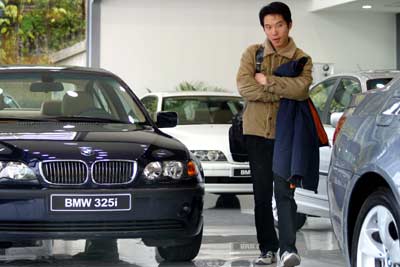|
10 years later, China issues new auto lines
By Gong Zhengzheng (China Daily)
Updated: 2004-06-01 22:40
The National Development and Reform Commission Tuesday launched a long-awaited new policy for China's fast-growing auto industry.

A Chinese customer looks at a BMW car in Nanjing, east China's Jiangsu Province. [newsphoto/file] |
The new policy release comes just a year after the commission, one of the major watchdogs for the auto industry, issued a draft policy seeking public opinion.
The new auto policy will substitute for the old one issued in 1994 by the State Council, China's cabinet.
It will both loosen and tighten restrictions on foreign investors in the auto industry from different perspectives.
Foreign investors will be allowed to control stakes of more than 50 per cent in automobile and motorcycle joint ventures (JVs) with Chinese partners "if their JVs are built in China's export processing zones and shoot at overseas markets," the new policy states.
Japan's Honda Motors has a 65 per cent share in a JV with China's Dongfeng Motor Corp and the Guangzhou Automobile Group.
All cars to be produced by the JV, located in the export processing zone in Guangzhou in South China's Guangdong Province -- will be exported.
The new policy will permit foreign investors to create more than two JV plants in China to produce same categories of vehicles, if they join forces with their existing Chinese partners to merge other companies in China.
General Motors (GM), the world's No 1 automaker, has four car JVs in China through mergers of local companies jointly with the Shanghai Automotive Industry Corp (SAIC) -- one of China's top three automakers.
Big Chinese automakers will be encouraged to team up with foreign partners to merge both domestic and foreign vehicle producers to "expand business boundaries in line with the auto industry's globalization," according to the new policy.
SAIC in late 2002 joined hands with GM and Japan's Suzuki to take over South Korea's Daewoo Motors.
This is the first overseas auto merger involving a Chinese vehicle maker.
The new policy also expects some internationally competitive Chinese automakers to join the ranks of the world's top 500 multinationals by 2010.
SAIC, which also runs a JV with Germany's Volkswagen, has attempted to become one of the top 500.
"These regulations are in accordance with the auto industry's latest development during the period after China's entry into the World Trade Organization and will speed up the restructuring of the fragmented sector," said Jia Xinguang, an analyst of the China National Automotive Industry Consulting and Development Corp.
There are now some 120 vehicle plants in China.
However, if a foreign automaker controls a relatively majority stake in another foreign firm, they will be treated as one entity when it comes to the requirement on the number of Sino-foreign JVs in China, the new policy states.
One of Chinese shareholders must have a stake bigger than the total of all foreign investors, if a Chinese listed automobile, motorcycle or other special-purpose vehicle producer sells its corporate shares, according to the new policy.
"The two requirements are intended to protect Chinese automakers through measures not violating the nation's commitments to the WTO," Jia said.
Foreign automakers appear cautious to comment on the new policy.
"We are studying the new policy and not yet available for comment," said Ye Wen, a communications manager for Volkswagen's China operations.
The new policy will enhance barriers on domestic non-auto investors in the industry.
Automakers in China that "could not maintain normal operations" will be forbidden to transfer their production permits to non-auto and motorcycle enterprises and individuals, it said.
The State will encourage these automakers to regroup assets with other vehicle producers.
If an automaker goes bankrupt, its production permit will be removed.
State to ensure health of auto market
The new policy said total investment of any new auto project should stand at 2 billion yuan (US$241 million) or more.
Such a project must include a product research and development organization with an investment of no less than 500 million yuan (US$60.4 million).
"The government hopes to use these regulations to cool overheating investment and overcapacity in the auto industry," said Yale Zhang, a Shanghai-based manager of CSM Worldwide, the US auto industry consulting firm.
"Plans of many non-auto enterprises in China, especially privately owned firms, to enter the industry will be derailed by these regulations."
The auto industry is widely seen as one of the overheated industrial sectors in China, thanks to massive investment from foreign automakers, and domestic State and privately owned enterprises.
Total investment in building new auto-making capacity will amount to 216.6 billion yuan (US$25.5 billion) by 2007 in China, according to figures released by the commission earlier.
Annual auto manufacturing capacity will total almost 15 million units in China by then.
Sales of domestically-made vehicles grew by 34 per cent to 4.39 million units last year.
The new policy also aims to foster a national united and open auto market mainly depending on private consumption.
All local governments will be forbidden to take discriminatory action on vehicles produced in other regions, the policy said.
"The State will carry out a national unified vehicle registering and checking system, and local governments cannot do likewise in their own ways," it added.
The Shanghai municipal government still imposes much higher charges on private car buyers than in the other regions in China by auctioning car plates in an effort to control car sales and prevent traffic jams in the city.
Average charges for a car plate in Shanghai stood at more than 34,000 yuan (US$4,100) last month.
A senior official from the Ministry of Commerce claimed around 10 days ago that Shanghai municipal government's action "violates related clauses of the law of road transportation security".
But the municipal government said it will not mend its ways any time soon.
|